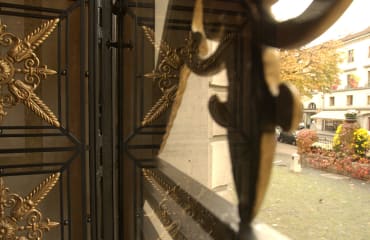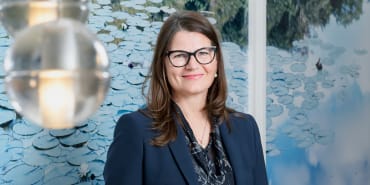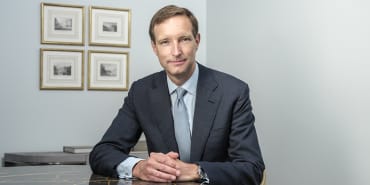Article published in The National on 14 September 2025.
Middle East wealth market no riskier than others, says Lombard Odier.
The Middle East market is neither more nor less risky than any other global jurisdiction – wealth managers must undertake proper due diligence on clients to avoid regulatory difficulties, senior executives at Swiss private bank Lombard Odier have said.
The Middle East is one of the fastest growing markets for Lombard Odier, and the bank is investing significant resources to more than double its assets under management in the region, Managing Partner Frederic Rochat and Ali Janoudi, Limited Partner and Head of New Markets at the 229-year-old Swiss private bank, told The National in Geneva.
Wealth managers should carefully choose who they want to serve, carry out the KYC (know-your-customer) process before onboarding, and understand market risks, Mr Rochat explained, adding, “I don’t think it is more risky … like every other region we operate in, it has specific risks that you need to be well aware of.”
[Lombard Odier] has been operating in the Middle East for more than 60 years
The bank, which has more than CHF 323 billion (USD 406 billion) in client assets at group level as of June 2025, has been operating in the Middle East for more than 60 years.
Lombard Odier has expanded its operations in the oil-rich region through a team of executives who know the market and the client base.
Read also: Lombard Odier reports half-year 2025 results
“It’s all about knowledge of the markets, and we have bankers who have been around for a long time,” Mr Rochat said. “We feel very comfortable and very committed to this part of the world, we understand the clients, we know the markets, and we also know what the regulators want.”
The Middle Eastern wealth management industry has grabbed headlines in recent weeks with HSBC, the biggest European bank by assets, being forced to let go of more than 1,000 wealthy customers in the region as it faces regulatory scrutiny over high-risk clients.
HSBC is ending its relationship with clients from markets including Saudi Arabia, Lebanon, Egypt and Qatar – many with assets of more than USD 100 million, Bloomberg and the Financial Times reported last month, citing unnamed sources.
However, Barry O’Byrne, chief executive of HSBC’s international wealth and premier banking, said the bank has an “absolute commitment to both our Middle East and Swiss wealth businesses,” and is pursuing significant growth in the region.
Like its larger Swiss counterparts, as well as global banking peers, Lombard Odier is also investing heavily in the Middle East to grab a larger share of the pie
Always on the radar
Like its larger Swiss counterparts, as well as global banking peers, Lombard Odier is also investing heavily in the Middle East to grab a larger share of the pie.
In addition to Switzerland, Lombard Odier continues to focus on Europe more broadly, including Belgium, France, Spain, Italy and the UK, where it has a “a lot of density” of customers. These markets are not the fastest growing in terms of GDP growth, however, Mr Rochat noted, “so, we’ve always been very interested in the Middle East, expanding our foothold in a fast-growth region.”
Saudi Arabia and the UAE, their peers in the six-member GCC economic bloc, and countries in the broader MENA region, have maintained strong growth momentum since bouncing back from the Covid-driven slowdown, outpacing most European and emerging markets.
Their robust economic growth, coupled with an influx of millionaires and the migration of family and institutional wealth from Europe and Asia, is drawing global asset and wealth managers to the Middle East.
The UAE’s measures to attract foreign investment, combined with its position as a gateway to the broader Middle East, Africa and South Asia regions, has helped it attract a whole host of family offices, private banks and asset managers in recent years.
Last year, JP Morgan Chase, the biggest US lender, said it is building a team of private bankers in the UAE, a move aimed at boosting the bank’s wealth management business in the region.
This month, Rothschild & Co, one of the world’s biggest financial advisory groups, said its wealth management business, which manages EUR 38 billion (USD 44.3 billion) in client assets, will take over the UAE operations of Liechtensteinische Landesbank.
In June, Switzerland’s Partners Group, with USD 150 billion in client assets, and Harrison Street, a USD 56 billion US-based property and infrastructure investment manager, began operations at Abu Dhabi’s ADGM.
related content.

our private banking and wealth management expertise in the middle east.
learn more Trillion-dollar asset managers including New York-based BlackRock, PGIM, the global asset management business of Prudential Financial, and Chicago investment firm Nuveen have also established bases in Abu Dhabi.
The UAE alone is expected to attract a record 9,800 relocating millionaires this year, drawn by regulatory reforms and a tax-free lifestyle, according to the Wealth Migration Report 2025 produced by advisory Henley & Partners and wealth intelligence firm New World Wealth. In 2024, Dubai had an estimated 81,200 millionaires and 20 billionaires.
Mr Janoudi highlighted that Lombard Odier’s investments in the Middle Eastern markets are paying dividends: “We have seen quite substantial business growth … across the region, [including] the GCC,” he said.
Swiss-established families account for one third of Lombard Odier’s private client business activity, with European accounts making up another third. The rest comes from new markets – of these, the Middle East makes up about two-thirds.
Globally, private wealth has reached a record USD 471 trillion, growing by more than USD 340 trillion since 1995, about eight times faster than the expansion of public wealth over the same period, the Dubai International Financial Centre said in its Future of Finance report this month.
The defining feature of the new era is the USD 124 trillion intergenerational wealth transfer set to take place in the next two decades, which offers significant opportunities to global wealth and asset managers.
This part of the world is moving very quickly, and we want to make sure we reach our targets. I have no doubt that we will – we’re on track so far
Middle East ambitions
Lombard Odier aims to build on the region’s growth momentum and its rapid wealth creation, doubling its Middle East assets under management by the end of this decade. It also aims to substantially expand its revenue base in the region over the same period.
“We definitely have an ambition, which has been presented to the executive committee,” Mr Janoudi said. “This part of the world is moving very quickly, and we want to make sure we reach our targets. I have no doubt that we will – we’re on track so far.”
The bank’s long relationships with clients and affluent families, which in some cases span two or three generations, has helped it to grow its business faster than the market. It has been hitting a “mid-to-high, single-digit growth rate” for both assets and the number of clients in the region, he noted.
Saudi Arabia, Opec’s largest oil producer; the UAE, the region’s commercial and tourism hub, and energy-rich Qatar and Kuwait remain key markets for Lombard Odier, he added.
However, the bank is not keen to expand its physical presence to other jurisdictions in the Middle East and plans to continue serving clients from its base in the UAE.
“We are quite wary of just opening and planting flags everywhere, because we are a bank of entrepreneurs for entrepreneurs,” Mr Rochat said. “We’re keen to leverage our existing regional hubs as much as possible.”
Withdrawal from ADGM
In August, Bloomberg reported that Lombard Odier was closing its office in Abu Dhabi’s financial hub ADGM, marking a rare exit by an international wealth and asset manager, with staff offered positions in either Dubai or Switzerland.
The private bank established its presence in ADGM in 2019 and went on to acquire a licence from DIFC in Dubai.
However, Mr Rochat said the bank is “actually not pulling out of anything in terms of the UAE and it continues to be a very strategic market for us.”
On the contrary, Lombard Odier is investing in the UAE, but it is doing so from DIFC and will consolidate operations, he said, with the bank investing more in terms of expertise and talent.
“The DIFC upgrade is important for us … [as] it’s not just about the UAE, it’s basically about having the regional platform that we can operate from.”
Discerning client base
A single base in the region allows Lombard Odier to gather its talent under one roof to better advise its customers, who, Mr Rochat said, are discerning and sophisticated in their investment approach, balancing risks with returns.
“What I’ve seen in the Middle East is that clients invest more or less the same way as European clients … and they are looking for quality investments, quality assets, where they can put their money to work,” he said.
“There is one difference, which is the dollar, because a lot of our clients in the Middle East are based in dollars, so obviously the question is an important one for them, [considering] the volatility that we’ve seen [in the US currency].”
There is also growing appetite for investments in hedge funds, as well as in private equity and emerging market assets from larger and smaller customers in the Middle East, as people hedge bets against the volatility in traditional asset classes, Mr Janoudi explained.
“It means some of our clients in the Middle East are looking at other areas besides Europe or the US. Are there any other areas where we could invest? They are asking us more and more about tactical investments,” he concluded.







share.